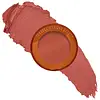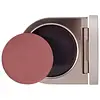Danessa Myricks Beauty Yummy Skin Blurring Balm Powder Flushed Versus Rose Inc Cream Blush Refillable Cheek & Lip Color
What's inside
What's inside
 Key Ingredients
Key Ingredients

 Benefits
Benefits

 Concerns
Concerns

 Ingredients Side-by-side
Ingredients Side-by-side

Magnesium Carbonate
AbsorbentIsohexadecane
EmollientC13-15 Alkane
SolventIsododecane
EmollientDimethicone
EmollientSqualane
EmollientSynthetic Wax
AbrasiveSynthetic Candelilla Wax
EmollientKaolin
AbrasiveTocopheryl Acetate
AntioxidantLinum Usitatissimum Seed Oil
PerfumingZingiber Officinale Root Oil
MaskingHydrolyzed Sodium Hyaluronate
Skin ConditioningGlyceryl Behenate
EmollientLimnanthes Alba Seed Oil
Skin ConditioningMicrocrystalline Wax
Emulsion StabilisingPolyethylene
AbrasiveStearoxy Dimethicone
EmollientTitanium Dioxide
Cosmetic ColorantIron Oxides
CI 19140
Cosmetic ColorantCI 15850
Cosmetic ColorantCI 45410
Cosmetic ColorantCI 42090
Cosmetic ColorantMagnesium Carbonate, Isohexadecane, C13-15 Alkane, Isododecane, Dimethicone, Squalane, Synthetic Wax, Synthetic Candelilla Wax, Kaolin, Tocopheryl Acetate, Linum Usitatissimum Seed Oil, Zingiber Officinale Root Oil, Hydrolyzed Sodium Hyaluronate, Glyceryl Behenate, Limnanthes Alba Seed Oil, Microcrystalline Wax, Polyethylene, Stearoxy Dimethicone, Titanium Dioxide, Iron Oxides, CI 19140, CI 15850, CI 45410, CI 42090
Ricinus Communis Seed Oil
MaskingPentaerythrityl Tetraisostearate
EmollientCaprylic/Capric Triglyceride
MaskingCopernicia Cerifera Wax
Oryza Sativa Bran Wax
Skin ConditioningHydrogenated Vegetable Oil
EmollientSynthetic Fluorphlogopite
Silica
AbrasiveIsononyl Isononanoate
EmollientLauroyl Lysine
Skin ConditioningEuphorbia Cerifera Wax
Squalane
EmollientSodium Hyaluronate
HumectantCeramide Ng
Skin ConditioningRosmarinus Officinalis Leaf Extract
AntimicrobialHelianthus Annuus Seed Oil
EmollientTocopherol
AntioxidantCaprylyl Glycol
EmollientHydrogenated Castor Oil
EmollientSorbitan Tristearate
Emulsifying1,2-Hexanediol
Skin ConditioningTropolone
Skin ConditioningAluminum Hydroxide
EmollientTin Oxide
AbrasiveMica
Cosmetic ColorantCI 77891
Cosmetic ColorantIron Oxides
CI 15850
Cosmetic ColorantCI 45410
Cosmetic ColorantRicinus Communis Seed Oil, Pentaerythrityl Tetraisostearate, Caprylic/Capric Triglyceride, Copernicia Cerifera Wax, Oryza Sativa Bran Wax, Hydrogenated Vegetable Oil, Synthetic Fluorphlogopite, Silica, Isononyl Isononanoate, Lauroyl Lysine, Euphorbia Cerifera Wax, Squalane, Sodium Hyaluronate, Ceramide Ng, Rosmarinus Officinalis Leaf Extract, Helianthus Annuus Seed Oil, Tocopherol, Caprylyl Glycol, Hydrogenated Castor Oil, Sorbitan Tristearate, 1,2-Hexanediol, Tropolone, Aluminum Hydroxide, Tin Oxide, Mica, CI 77891, Iron Oxides, CI 15850, CI 45410
Alternatives
Ingredients Explained
These ingredients are found in both products.
Ingredients higher up in an ingredient list are typically present in a larger amount.
Ci 15850 is the pigment color red. It is an azo dye and created synthetically.
Azo dyes need to be thoroughly purified before use. This allows them to be more stable and longer-lasting.
This ingredient is common in foundations, lipsticks, and blushes. This color is described as brown/orangey red.
It has many secondary names such as Red 6 and Red 7. According to a manufacturer, Red 6 usually contains aluminum.
Learn more about CI 15850CI 45410 is a synthetic red-pigment and dye.
It often goes by both Red 28 or Red 27; manufacturers label both ingredients as CI 45410.
This dye is commonly found in makeup because it imparts a vivid color. Some types of this dye change color based on pH level and interaction with moisture:
Your skin has a natural pH of around 4.5 - 5.5.
According to the FDA, CI 45410 is not permitted for use in eye products.
Red 27 is a flourescein dye and commonly used as a fluorescent tracer in medicine.
Learn more about CI 45410Squalane is an emollient that helps the skin hold onto moisture. It's an oily liquid that occurs naturally in certain types of fish and plant oils.
Because squalane boosts hydration in the skin, it also comes with plenty of benefits: it is an antioxidant and can help fight free radicals and skin damage. Squalane is also found to have a detoxifying effect when applied.
Squalane comes from squalene, which occurs naturally within the sebum of our skin. It is one of the oils our skin produces to keep itself hydrated. Squalane is the hydrogenated version of squalene and has a longer shelf life.
Research shows that squalane is non-irritating (even at 100% concentration).
In general, it's a fantastic ingredient. It does a great job at hydrating the skin, and it's suitable for those with sensitive skin.
The source of squalane may impact malassezia / fungal acne. This is because olive oil derived squalane can contain impurities such as fatty acids and plant waxes. Sugarcane derived squalane is recommended for anyone with malassezia concerns.
Is squalane vegan?
This depends on the source. Squalane can be derived from both plants and animals. Most squalane used in skincare comes from plants.
Please note: the source of squalane is only known if disclosed by the brand. We recommend reaching out to the brand if you have any questions about their squalane.
Read more about squalene with an "e".
Is squalane an oil?
Squalane is often called an oil, but it’s technically not; it’s a hydrocarbon, meaning it’s only made of carbon and hydrogen, unlike true oils which are triglycerides made of fatty acids and glycerol.
The term “oil-free” isn’t regulated, so companies can define it however they want. Some exclude all oils, while others just avoid mineral oil or comedogenic oils.
While some people avoid oils thinking they cause breakouts, the right kind of oil (or oil-like ingredient like squalane) can actually help balance and hydrate your skin. It’s worth testing out simple oils or squalane to see what works best for your skin.
Learn more about SqualaneThis ingredient is a combination of red, black, and yellow iron oxide pigments. This combination of colors is usually found in foundation, because it results in a "skin" color.